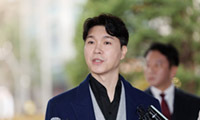BY BENNY MESHOULAM, PACIFIC NEWS SERVICE
SAN FRANCISCO-By many accounts, last fall’s elections should have increased the number of Asian-Americans on San Francisco’s Board of Supervisors, the city’s chief governing body.
With Asians-the majority of them Chinese-comprising nearly 40 percent of the city’s population, an increased Asian presence on the 11 member Board seemed likely.
Instead, after December’s runoff election, two of the three Asians on the board, Mabel Teng and Michael Yaki, lost their seats, leaving District 4 incumbent Leland Yee the sole Asian on the board.
"The thinking across the board was that there were going to be more Asians," says David Lee, executive director of the Chinese American Voters Education Committee (CAVEC), a non-partisan voter outreach organization. "But now, we’re back to 1990 numbers [of Asian-Americans on the board."
Lee’s expectations were based not only on population, but on the introduction of a new law calling for supervisors to be elected by district rather than a citywide vote-instituted in part to increase the political influence of marginalized communities.
Despite the losses, Lee’s efforts have not diminished. He hopes to apply this past fall’s lessons to upcoming campaigns.
The next test, he says, is the March, 2002, race for State Assembly in the 12th District. One Asian, Superior Court Judge Lillian Sing, has officially declared her candidacy and Supervisor Yee may enter the contest.
Before that race begins, Lee believes, the Asian community must set clear goals. Last fall, there was a "failure of the Asian-American community leadership to come to agreement on who should be running," Lee laments."Instead, you had multiple Asians running against each other. Clearly, that divided the vote."
Judge Sing, on a one-year leave of absence to prepare for next March’s election, agrees. "It’s simple," she says. "When you dilute your support, you’re weakened."
However, Lee sees other reasons for the loss, involving citywide politics issues, primarily negative sentiment toward Mayor Willie Brown and his supporters.
"Candidates misread district elections" by not recognizing these sentiments early on, says Lee. He feels that Tom Hsieh Jr., who ran against Yee in District 4, hurt his candidacy by emphasizing his ties to Mayor Brown. "Had Hsieh known there was going to be such a backlash against Willie Brown, he would have emphasized his independence instead of his ties to him."
Hsieh, a Chinese-American who runs his own public relations and political consulting firm, acknowledges that anti-Brown feeling played a part in his defeat, but stands by his decision to emphasize his ties with the Mayor.
Hsieh blames district elections in large part for the loss of Asian seats. They led to an emphasis on the concerns of neighborhoods over those of specific demographic groups. "Because the Asian community was divided up across districts, we had less power," says Hsieh.
Lee agrees. "Neighborhood, community concerns trumped identity politics," says Lee. "That’s something the Asian community was weak in: parks, graffiti abatement, pedestrian safety issues."
What happens next? Judge Sing has yet to garner the support of either Teng or Supervisor Yee-two of the Asian community’s more visible leaders. And if Yee does decide to run, there are fears that the presence of more than one Asian on the ballot will once again dilute support.
Some in the Asian community disagree fundamentally with this analysis, and argue that backing Asian candidates is not necessarily advantageous to the Asian community. Among them is Supervisor Yee, who credits his victory to a strategy that rejected identity politics.
Yee believes that such strategies are too narrow, and that the Asian community would have maintained or increased its representation on the Board if it had worked outside the framework of identity politics.
The people who predicted greater Asian representation "are out of touch with the body politic in the city of San Francisco," he says, and their thinking is a "throwback to years gone by."
(Yee’s own practice is not without contradictions. Despite his staunch opposition to political tactics focused on racial and cultural identity, he maintains a liaison in Chinatown, although his Sunset district lies miles away.)
Hayden Lee, former president of the Chinese American Democratic Club, notes that non-Asian officials have the potential to do just as much for his community as Asians.
Supervisors Sophie Maxwell and Aaron Peskin, he believes, are already showing signs of doing a tremendous amount for the Asian community. "We’ve got to go beyond supporting Chinese or Asians just because they’re Chinese or Asian," says Hayden Lee.
스마터리빙
more [ 건강]
[ 건강]이제 혈관 건강도 챙기자!
[현대해운]우리 눈에 보이지 않기 때문에 혈관 건강을 챙기는 것은 결코 쉽지 않은데요. 여러분은 혈관 건강을 유지하기 위해 어떤 노력을 하시나요?
 [ 건강]
[ 건강]내 몸이 건강해지는 과일궁합
 [ 라이프]
[ 라이프]벌레야 물럿거라! 천연 해충제 만들기
 [ 건강]
[ 건강]혈압 낮추는데 좋은 식품
[현대해운]혈관 건강은 주로 노화가 진행되면서 지켜야 할 문제라고 인식되어 왔습니다. 최근 생활 패턴과 식생활의 변화로 혈관의 노화 진행이 빨라지고
사람·사람들
more많이 본 기사
- [특파원시선] 외식비 줄이는 미국… ‘30% 요구’ 팁 공포도 한몫?
- 인도 투어 나선 축구스타 메시…경기장 조기 퇴장에 팬들 난동
- 정용진 신세계그룹 회장, 밴스 부통령 성탄절 만찬 참석
- 10석 안팎까지?…내년 한국 지방선거 때 ‘미니 총선급’ 재보선 가능성
- 아이비리그 브라운대서 총격…최소 2명 사망, 8명 중상
- 오세훈 “내집 마련 꿈, 10·15대책에 짓밟혀…규제 완화해야”
- 뉴욕 백화점서 아기 기저귀 갈던 엄마, 정신질환자에 흉기피습
- 1124일만 선고.. ‘20억 횡령 인정’ 박수홍 친형 결론은?
- 변요한♥티파니, 약지에 ‘커플링·포르쉐’..열애 中 티냈다
- 조미김, 미국 수출관세 ‘면제’됐다…K-김 최대시장서 날개
- 트럼프, 시리아서 IS 공격으로 美병사 사망하자 “강력 보복”
- 한소희, 韓 떠나기 전 의미심장 SN… 1
- 연말연시 과음 후 속쓰림…단순숙취? “급성염증 신호일수도”
- ‘김민재 점점 독일 국대에 밀린다’ 독일 현지, 타 향해 연일 찬사... “뮌헨 최고의 영입, 진정한 수비 리더”
- 김연아♥고우림, 사랑하니 닮아가네..예쁜 커플사진
- 아이비리그 브라운대서 총격…최소 2명 사망, 8명 중상
- 지선 손 맞잡을까…통일교 특검으로 거리 좁히는 국힘·개혁신당
- TV 나와 암투병 근황 공개한 찰스 英국왕… “조기검진 중요해요”
- “다카이치 ‘대만발언’은 對中전략 부재 탓…정상 만나야 해결”
- ‘인니 수마트라섬 대홍수’ 사망자 1천명 넘어…218명 실종
- “한국, 재래식 방위주도” 한미 핵협의그룹 첫 명시
- AI 시장 흔들렸다…챗GPT 독주 속 제미나이 급부상
- ‘트럼프 골드카드’신청 시작, 100만달러 내면 미 영주권
- 한화, 호주 방산업체 최대주주 된다
- ‘아프리카에 당한 기억’ 홍명보, ‘1승 제물’ 남아공 경계했다... 박문성도 “2014 월드컵 악몽 떠올라”
- 국방부 “시리아서 공격받아 미군 2명 사망…공격범 사살”
- 소셜연금 NY 2,018달러·NJ 2,190달러
- 트럼프 “인디애나 선거구 조정 반대한 공화의원들, 교체돼야”
- 이정후 태극마크 ‘청신호’ 떴다! 스타 출신 SF 사장 “야수보단 투수가 WBC 위험”→걸림돌 사라졌다
- 시리아서 미군 피격, 3명 사망… “시리아군 내 극단주의자 소행”
- 與, 은행법 처리뒤 ‘경찰관직무집행법… 2
- 굽히지 않는 젤렌스키…트럼프에 역제안 카드로 레드라인 저지
- 트럼프 “태국·캄, 교전 중단 합의”… 1
- 美, 카리브해 군사자산 확대… “베네수엘라에 지상·전자전 위협”
- 韓 탁구 최초 역사… 신유빈-임종훈, 세계랭킹 1위+파리올림픽 金 듀오 꺾고 WTT 파이널스 우승
- 김찬수씨, 포토맥 포럼에 2천달러 기부
- ‘손흥민 벽화 3일 만에 그린’ 예술가, SON과 감격 만남 후 “내 아들의 영웅이자 아시아 유산” 찬사
- 변요한♥티파니, 결혼 전제 열애 인정
- 국힘·개혁신당 “통일교 특검 수용하라”…與 “정치공세·물타기”
- MD한인회장 또‘무후보’
- 트럼프 “인디애나 선거구 조정 반대한 공화의원들, 교체돼야”
- 내란특검, 김용현 추가 기소… “HID요원 등 명단 노상원에 넘겨”
- “귀금속 역사상 가장 극적인 재평가”…올해는 銀이 金 앞섰다 [공준호의 탈월급 생존법]
- 워싱턴주 홍수로 수만명 대피…주지사 “유례없는 상황 직면”
- 한국 교사 10명, 페어팩스 초등교 배치
- “엔비디아, 中수요 반영 H200 증산”…일각선 “中, 수입거부할듯”
- 뉴욕증시, 브로드컴 비관론에 AI 테마 ‘와르르’…나스닥 1.7%↓ 마감
- 종묘 일대 세계유산지구로 세운4구역 개발 영향 줄까
- 선교사 아들 가나대사로 금의환향… “… 1
- “머스크의 X, 3분기 매출 7억 달러대…순손실 5억 달러대”
1/5지식톡

-
 테슬라 자동차 시트커버 장착
0
테슬라 자동차 시트커버 장착
0테슬라 시트커버, 사놓고 아직 못 씌우셨죠?장착이 생각보다 쉽지 않습니다.20년 경력 전문가에게 맡기세요 — 깔끔하고 딱 맞게 장착해드립니다!장착비용:앞좌석: $40뒷좌석: $60앞·뒷좌석 …
-
 식당용 부탄가스
0
식당용 부탄가스
0식당용 부탄가스 홀세일 합니다 로스앤젤레스 다운타운 픽업 가능 안녕 하세요?강아지 & 고양이 모든 애완동물 / 반려동물 식품 & 모든 애완동물/반려동물 관련 제품들 전문적으로 홀세일/취급하는 회사 입니다 100% …
-
 ACSL 국제 컴퓨터 과학 대회, …
0
ACSL 국제 컴퓨터 과학 대회, …
0웹사이트 : www.eduspot.co.kr 카카오톡 상담하기 : https://pf.kakao.com/_BEQWxb블로그 : https://blog.naver.com/eduspotmain안녕하세요, 에듀스팟입니다…
-
 바디프렌드 안마의자 창고 리퍼브 세…
0
바디프렌드 안마의자 창고 리퍼브 세…
0거의 새제품급 리퍼브 안마의자 대방출 한다고 합니다!8월 23일(토)…24일(일) 단 이틀!특가 판매가Famille: $500 ~ $1,000Falcon: $1,500 ~ $2,500픽업 & 배송직접 픽업 가능LA…
-
 바디프렌드 안마의자 창고 리퍼브 세…
0
바디프렌드 안마의자 창고 리퍼브 세…
0거의 새제품급 리퍼브 안마의자 대방출 한다고 합니다!8월 23일(토)…24일(일) 단 이틀!특가 판매가Famille: $500 ~ $1,000Falcon: $1,500 ~ $2,500픽업 & 배송직접 픽업 가능LA…
케이타운 1번가
오피니언

22기 LA평통 출범에 거는 기대

연말 시즌 사기·범죄 경계해야
 메건 매카들 워싱턴포스트 칼럼니스트
메건 매카들 워싱턴포스트 칼럼니스트 [메건 매카들 칼럼] 장편영화의 마지막 챕터인가
 김미선 서북미문인협회 회장시인
김미선 서북미문인협회 회장시인 [한국춘추] 하늘을 계산한 사람들, 칠정산
 이희숙 시인·수필가
이희숙 시인·수필가 [금요단상] 그을린 자리에서 다시
 심상용 / 서울대 미술관장
심상용 / 서울대 미술관장 [미술 다시보기] 지옥에 대하여
 서정명 / 서울경제 기자
서정명 / 서울경제 기자[만화경] 주한미군과 ‘도련선 리스크’
 한 영 재미수필가협회 회장
한 영 재미수필가협회 회장 [한영의 독서칼럼] 불안한 사람들
 정영현 서울경제 테크성장부장
정영현 서울경제 테크성장부장 [여명] 콘크리트가 데이터가 됐을 뿐, 달라진 게 없다
1/3지사별 뉴스

“마약밀매·인신매매 등 국제범죄 척결” ‘국토안보 태스크포스’ 뉴욕지부 출범
연방 국토안보부가 10일 ‘국토안보 태스크포스’(HSTF) 뉴욕지부를 출범시켰다.HSTF는 마약 카르텔, 인신매매, 자금세탁, 갱단 등 국제범…
‘오바마케어 보조금’ 올해 말 종료 가능성 ↑ 커져

한국 교사 10명, 페어팩스 초등교 배치
‘글로벌 앰버서더 티처스 프로그램’(Global Ambassador Teachers Program)은 국제 교사 교환 프로그램 가운데 하나로 …
김찬수씨, 포토맥 포럼에 2천달러 기부

아이비리그 브라운대서 총격…최소 2명 사망, 8명 중상
13일 동부 ‘아이비리그’ 명문대 중 하나인 브라운대 캠퍼스 내에서 총격 사건이 벌어져 다수의 사상자가 나왔다.AP통신과 CNN방송 등 언론에…
<부음> 이명무 전 SF 체육회장 부인상

오늘 하루 이 창 열지 않음 닫기 





















































.png)


댓글 안에 당신의 성숙함도 담아 주세요.
'오늘의 한마디'는 기사에 대하여 자신의 생각을 말하고 남의 생각을 들으며 서로 다양한 의견을 나누는 공간입니다. 그러나 간혹 불건전한 내용을 올리시는 분들이 계셔서 건전한 인터넷문화 정착을 위해 아래와 같은 운영원칙을 적용합니다.
자체 모니터링을 통해 아래에 해당하는 내용이 포함된 댓글이 발견되면 예고없이 삭제 조치를 하겠습니다.
불건전한 댓글을 올리거나, 이름에 비속어 및 상대방의 불쾌감을 주는 단어를 사용, 유명인 또는 특정 일반인을 사칭하는 경우 이용에 대한 차단 제재를 받을 수 있습니다. 차단될 경우, 일주일간 댓글을 달수 없게 됩니다.
명예훼손, 개인정보 유출, 욕설 등 법률에 위반되는 댓글은 관계 법령에 의거 민형사상 처벌을 받을 수 있으니 이용에 주의를 부탁드립니다.
Close
x